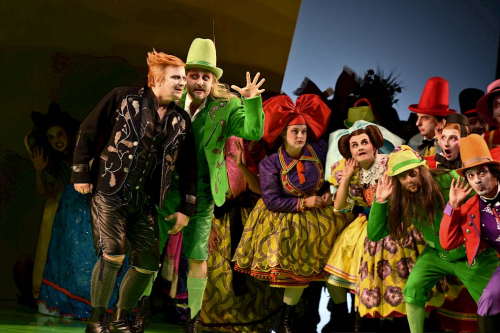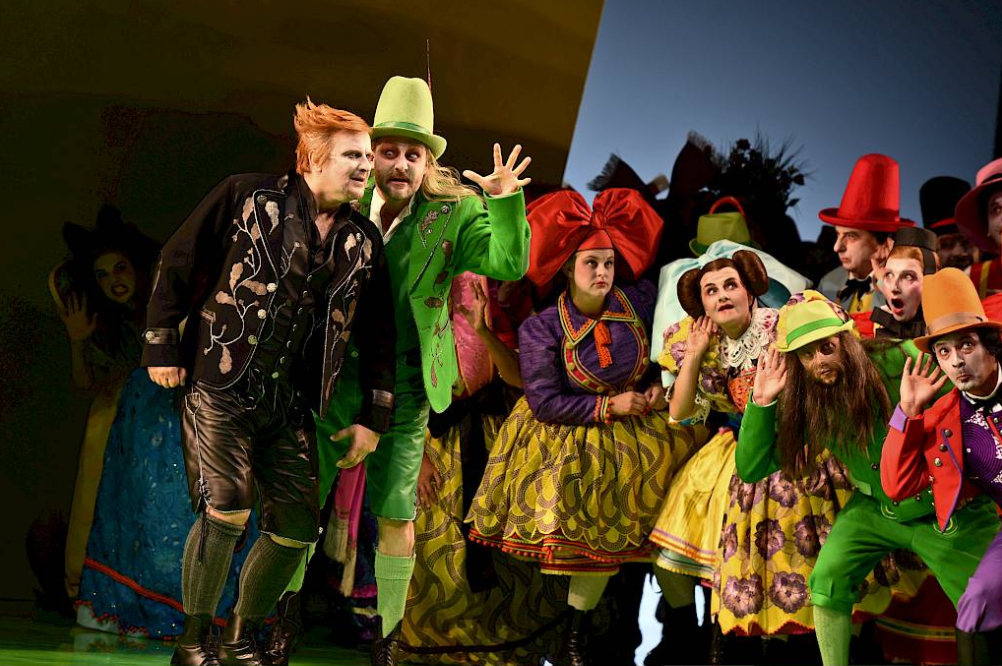 Switzerland Weber: Der Freischütz: Soloists and Chorus of the Opernhaus Zürich / Axel Kober (conductor), Opernhaus Zürich, Zurich, 29.9.2019 and 4.10.2019. (CCr)
Switzerland Weber: Der Freischütz: Soloists and Chorus of the Opernhaus Zürich / Axel Kober (conductor), Opernhaus Zürich, Zurich, 29.9.2019 and 4.10.2019. (CCr)

Production:
Director, set and video designer – Herbert Fritsch
Costume designer – Victoria Behr
Lighting designer – Torsten König
Choir director – Ernst Raffelsberger
Cast:
Prince Ottokar – Oliver Widmer
Kuno – Michael Hauenstein
Agathe – Jacquelyn Wagner
Ännchen – Lydia Teuscher
Kaspar – Christof Fischesser
Max – Benjamin Bruns
Hermit – Ildo Song
Kilian – Yannick Debus
Samiel – Florian Anderer
First hunter – Benjamin Mathis
Second hunter – Sebastian Zuber
Four bridesmaids – Laura Missuray, Franziska Montiel, Emily Stern, Julie Ann Bartholomew
The first thing you ask when you see the colours on the stage is whether you ingested some funny mushrooms, or should have; the second is how much all these costumes cost. The third is where the forest went – this is German Romanticism, bitte sehr – until you realise: the people are the forest, the hoop skirts and the hypocrites wearing bows and wigs are the thicket through which our hero must sort.
As a rule, Herbert Fritsch’s stages can scream so loudly at you that it is natural to assume a defensive posture and look for reasons to dislike such candied vanity. Some critics were able to maintain this posture nearly through the end, others never even made it past the hallucinogenic bull’s eye that accompanied the overture. On that note, there are indeed too many directors who are afraid of letting the music of the overture speak for itself, lest, god forbid, people have nothing else to do for a few minutes but listen to music in an opera house. Fritsch here is one of them, tsk tsk.
These costumes (by Victoria Behr, who also worked with Fritsch on his excellent 2013 Die Physiker at the Zurich Schauspielhaus, and on the Molière Amphitryon currently playing in Berlin) look as if the residents of the Swiss Lötschental were asked to bring their carnival Tschäggättä to the studios of RuPaul’s drag race and to collaborate on a Christmas pantomime. There are leprechauns in lederhosen, for heaven’s sake. Try resisting that for three hours; you cannot.
And why not ‘go big or go home’, as they say in America, when it comes to this 1821 fantastical opera beloved by Germans? It is hard to begrudge Fritsch and Behr their fun; the story is essentially a fairy tale, perfect for children with slightly darker propensities and full of those Germanic themes that would occupy German music for decades: the forest, the supernatural, courage, curses, and redemption through love.
This is the story of a hunter (Max) who makes a deal with a shady character (Kasper), who himself made a deal with the devil (Samiel), in order to win a shooting contest. In doing so Max unwittingly puts the life of his girlfriend (Agathe) at stake and shoots himself in the foot (figuratively, of course) when he enters an execrated glen of wolves at night to cast some black magic bullets. The ending is all happiness and justice, but how did we get here again?
You see, Max needs to win a shooting contest because, although normally a good shot, he has been cursed by Kasper and Samiel not to hit any target for weeks. This prompts Kuno, the chief of local forestry and the father of Agathe, to convene the contest on which this story hinges, making Max’s victory the condition for winning his daughter’s hand in marriage. Max is miserable. Kuno’s response? ‘Trust in God’.
Remember that dismal imperative from the complacently high and mighty the next time the cards are stacked against you.
Any story with a moral that warped, set for an audience of bourgeois Berliners to take place ostensibly right after the horrible 30 Years’ War, should invite a director with a sardonic approach. Fritsch fits the bill. He gives us a vaudevillian Satan (the most excellent Florian Anderer, in a non-singing role) and adds a great deal of wit and charm to this easily leaden tale. Fritsch is certainly not the first to pair the satanic with the comedic – Coleridge reminded us that the devil is ‘the extreme of all humour’ if not perfectly humorous – but he does it here to great effect. If the youthful flush of the story’s champion Max wanes as a result of Samiel’s stealing the show, well, Max has always been a bit dopey, his arias a tad saccharine. Fritsch’s use of the devil is a means to highlight this without any cynicism towards its despairing hero.
Musically, the Zurich opera public was treated to an orchestra of voluptuous force, the Philharmonia being led by Axel Kober. Kasper’s glowering drinking song as he wiles Max was played with muscular pomp, a delight. The chorus, the men a mess with entrances, was nevertheless at their ensemble best when it came to composing an uncanny mass upon the stage, moving and eventually singing with full panache; their greatest achievement was to wear those outlandish costumes so naturally.
As for the singing, American soprano Jacquelyn Wagner as Agathe lacked the splayed breadth necessary for good phrasing, and her singing could be pretty at the cost of bite. But her German was perfect, and her insolent acting integrated wonderfully into this revival. Ännchen was also well cast with Lydia Teuscher, a consummate performer, who nevertheless struggled to distinguish her sound. The men fared better: Benjamin Bruns’s lush tenor had a strained top during the first matinée but was better during the second performance I heard; he is a singer who can keep the Mozartian inwardness of Weber’s music and still flirt with Wagnerian booming. The many ancillary voices – of Michael Hauenstein as Kuno, Christof Fischesser as a snarling Kaspar, Yannick Debus as Max’s first tormentor Kilian, and Ildo Song as the Sarastro-ex-machina at the very end of the work – were all distinguished.
Casey Creel
